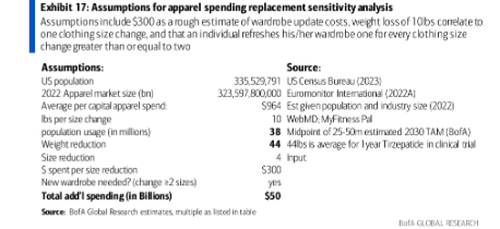
If Ozempic and or Mounjaro users can avoid processed foods and get some exercise, they'll likely maintain their weight loss. The good news is that some of these individuals, who have ditched greasy burgers and donuts, are possibly already on the hunt for smaller clothes.
Jennifer Hyman, co-founder and CEO of clothing rental company Rent the Runway, spoke to Wall Street Journal's Suzanne Kapner about the emerging trend of customers switching to smaller sizes more than at any other time in the past 15 years.
Hyman noted that these customers are increasingly open to experimenting with different styles, such as cutouts and other body-baring features. "When you feel more comfortable in your skin, you're more willing to try edgier looks," she added.
At fashion retailer Lafayette 148, the brand's chief executive, Deirdre Quinn, told WSJ's Kapner that approximately 5% of its customer base has already begun buying new outfits because of weight loss.
Quinn said some customers are replacing their size 12 clothes with size 6 or 8. She said the downsizing trend boosts sales and saves the company money because smaller sizes use less fabric.
Abhi Madan, co-founder and creative director of dressmaker Amarra, stated, "Over the past year, our retailers have been telling us they need smaller sizes."
As of May, 1 in 8 adults in the US had used GLP-1 drugs, equivalent to more than 15 million people. Recently, Novo Nordisk, the maker of Ozempic and Wegovy, said that at least 25,000 people are beginning its weight loss treatment weekly.
Bank of America analyst Geoff Meacham first wrote about the downsizing theme last fall in a note that revealed the downstream effects of the obesity drug will impact the apparel industry, as "eventual weight loss in the broader population could spur a wardrobe replacement cycle."
Meacham said that an adoption rate of 38 million individuals using weight-loss drugs (midpoint of BofA's estimated 2030 TAM) combined with the assumption of buying new clothing could result in $50 billion of new apparel spending.
Next up, as Bloomberg penned in a recent note, GLP-1 drugs are likely going to target "America's fat pets."
If Ozempic and or Mounjaro users can avoid processed foods and get some exercise, they’ll likely maintain their weight loss. The good news is that some of these individuals, who have ditched greasy burgers and donuts, are possibly already on the hunt for smaller clothes.
Jennifer Hyman, co-founder and CEO of clothing rental company Rent the Runway, spoke to Wall Street Journal’s Suzanne Kapner about the emerging trend of customers switching to smaller sizes more than at any other time in the past 15 years.
Hyman noted that these customers are increasingly open to experimenting with different styles, such as cutouts and other body-baring features. “When you feel more comfortable in your skin, you’re more willing to try edgier looks,” she added.
At fashion retailer Lafayette 148, the brand’s chief executive, Deirdre Quinn, told WSJ’s Kapner that approximately 5% of its customer base has already begun buying new outfits because of weight loss.
Quinn said some customers are replacing their size 12 clothes with size 6 or 8. She said the downsizing trend boosts sales and saves the company money because smaller sizes use less fabric.
Abhi Madan, co-founder and creative director of dressmaker Amarra, stated, “Over the past year, our retailers have been telling us they need smaller sizes.”
As of May, 1 in 8 adults in the US had used GLP-1 drugs, equivalent to more than 15 million people. Recently, Novo Nordisk, the maker of Ozempic and Wegovy, said that at least 25,000 people are beginning its weight loss treatment weekly.
Bank of America analyst Geoff Meacham first wrote about the downsizing theme last fall in a note that revealed the downstream effects of the obesity drug will impact the apparel industry, as “eventual weight loss in the broader population could spur a wardrobe replacement cycle.”
Meacham said that an adoption rate of 38 million individuals using weight-loss drugs (midpoint of BofA’s estimated 2030 TAM) combined with the assumption of buying new clothing could result in $50 billion of new apparel spending.
Next up, as Bloomberg penned in a recent note, GLP-1 drugs are likely going to target “America’s fat pets.”
Loading…






